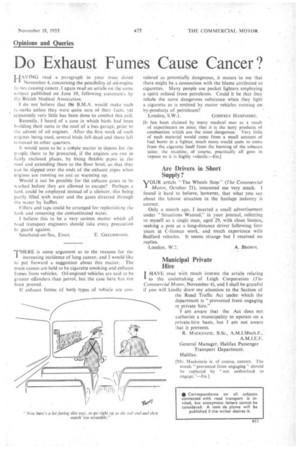Do Exhaust Fumes Cause Cancer?
Page 45

If you've noticed an error in this article please click here to report it so we can fix it.
HAVING read a paragraph in your issue dated
November 4, concerning the possibility of oil-engine fti ries causing cancer, I again read an article on the same subject published on June 10, following statements by the British Medical Association.
I do not believe that the B.M.A. would make such rc:atarks unless they were quite sure of their facts, yet apparently very little has been done to combat this evil.
Recently, I heard of a case in which birds had been building their nests in the roof of a-bus garage, prior to the advent of oil engines. After the first week of such engines being used, several birds fell dead and those left removed toother quarters.
It would seem to be a sintple matter in depots for the p2op1e there to be protected, if the engines are run in fairly enclosed places, by fixing flexible pipes in the roof and extending them to the floor level, so that they can be slipped over the ends of the exhaust pipes when engines are running on test or warming up.
Would it not be possible for the exhaust gases to be washed before they are allowed to escape? Perhaps a tank could be employed instead of.a silencer, this being partly filled with water and the gases directed through the water by 'baffles.
Fillers and taps could be arranged for replenishing the tank and removing the contaminated water.
1 believe this to be a very serious matter which all road transport engineers should take every precaution to guard against.
Southend-on-Sea, Essex. E. GREENWOOD.
sidered as potentially dangerous, it occurs to me that there might be a connection with the blame attributed to cigarettes. Many people use pocket lighters employing a spirit refined from petroleum. Could it be that they inhale the same dangerous substance when they light a cigarette as is emitted by motor vehicles running on by-products of petroleum?
London, S.W.1. GODFREY HAMPSHIRE.
[It has been claimed by many medical men as a result of experiments on mice, that it is the tarry products of combustion which are the most .dangerous. Very little of such material would come from a small amount of fuel burnt in a lighter, much more would seem to come from the cigarette itself from the burning of the tobacco juice; the nicotine, of course, practically all goes in vapour as it is highly volatile.—ED.]
Are Drivers in Short Supply?
"¼/OUR article "The Wheels Stop" (The Commercial I Motor, October 21), interested me very much. 1 found it hard to believe, however, that what you say about the labour situation in the haulage industry is correct.
Only a month ago, I inserted a small advertisement under "Situations Wanted," in your journal, referring to myself_ as a single man, aged 29, with clean licence; seeking a post as a long-distance driver following four years in C-licence work, and much experience with Bedford vehicles. It seems strange but I received no replies.
.London, W.2.
Municipal Private Hire
I HAVE read with much interest the article relating I to the ..undertaking of Leigh Corporation (The Commercial Motor, November 4), and I shall be grateful if you will kindly draw my attention to the Section of the Road Traffic Act under which the department is "prevented from engaging in private hire."
I am aware that the Act .does not authorize a municipality to operate on a private-hire basis, but I am not aware that it prevents.
R. M ACK ENZIE, B.Sc., A.M.I.Mech.E.,
A.M.I.E.E. General Manager, Halifax Passenger
Transport Department.
Halifax.
[Mr. Mackenzie is, of course, correct. The words "prevented from engaging should be replaced by " not authorized to cngage."—ED.)




































































































